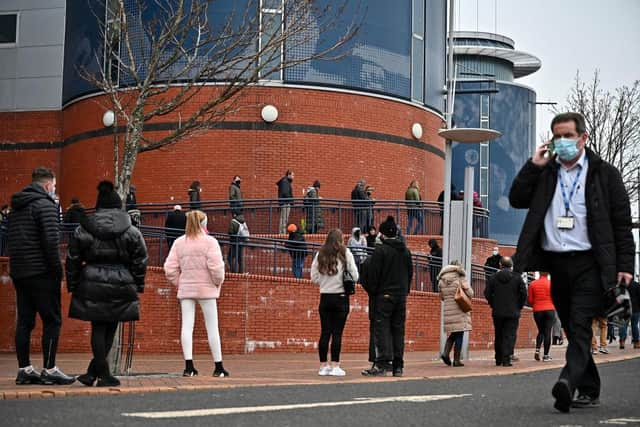Covid Scotland: Doctors speak about deaths amid warnings to seek booster before Hogmanay
and live on Freeview channel 276
Clinicians from NHS Greater Glasgow and Clyde (NHSGGC) stressed that hospitals were already nearing capacity and that staff were tired from relentless pressure.
And they warned people not to become complacent due to reports that Omicron causes less severe illness than other variants.


Advertisement
Hide AdAdvertisement
Hide AdDr Claire Harrow, chief of medicine for Inverclyde Royal Hospital, Royal Alexandra Hospital in Paisley and the Vale of Leven Hospital in Alexandria, said: “I’ve been on Covid wards since March 2020 and seeing people die from Covid-19 has been absolutely heart-breaking.
“We are trying our best to look after all our patients, but our hospitals are nearly at capacity looking after non-Covid-19 patients.
“We’re experiencing staffing challenges due to Covid-19 and our teams are tired from the relentless pressure being put on them.
“The one thing the public can do is to get boosted to help minimise further spread of this awful virus.”
Advertisement
Hide AdAdvertisement
Hide AdDr Andy Mackay, clinical director and consultant in critical care at Queen Elizabeth University Hospital (QEUH) in Glasgow, said it was vital that people got their booster jab.
He said: “Our critical care units and hospitals are already very busy. My colleagues and I continue to do our best for our patients but it’s essential that we all do what we can to prevent the additional avoidable stress of Covid-19 on the health service.”
John Carson, chief nurse at Glasgow Royal Infirmary, urged people not to delay getting a booster in case it disrupted the holidays.
He said hospitals were already in an “extremely difficult” position.
“We can’t afford for it to get worse,” he said.
Advertisement
Hide AdAdvertisement
Hide Ad“Please get the vaccine – it only takes a short time out of your day and the side effects for the vast majority are very mild.
“This is a very small trade-off to help support the health service, and the only way we’ll be able to survive through the winter.”
Dr Umberto Fazzi, consultant surgeon at QEUH, said: “You may be hearing in the press that Omicron might result in less severe illness.
“However, this doesn’t mean you won’t need hospital treatment and so please make sure you’ve had your vaccines and been boosted.
Advertisement
Hide AdAdvertisement
Hide Ad“Our hospitals are already very busy and we all need to do as much as possible to take pressure off them.”
Thousands of new vaccine clinics have opened across NHSGG, as well as other parts of Scotland, in recent weeks and an army of additional vaccinators have been recruited.
The warnings come as a leading public health expert said UK Government guidance on the main Covid symptoms to look out for needed urgently updating given the predominant signs of the Omicron variant are similar to colds.
Professor Tim Spector, lead scientist on the Zoe Covid study and professor of genetic epidemiology at King’s College in London, said he found it “very odd” that government campaigns such as NHS posters did not list sneezing, headaches and a runny nose as signs of Omicron.
Advertisement
Hide AdAdvertisement
Hide AdHe said the main messaging still coming from the Government was urging people to look out for traditional Covid symptoms of a high temperature, continuous cough and a loss of a sense of smell.
But Prof Spector said many people do not experience these symptoms at all with the Omicron variant – and even if they do, by the time these symptoms emerge, they will have already unknowingly infected others and spread the illness.
He said he believed the symptom messaging was now outdated and the more common Covid symptoms urgently needed greater publicity.
“I don’t understand why the NHS posters never mention the cold-like symptoms which are the main sign of the Omicron variant,” he said.
Advertisement
Hide AdAdvertisement
Hide Ad“It is very odd when we are supposed to be trying to curb the spread of this virus.
“As a result, people who are experiencing cold-like symptoms are dismissing them and waiting for signs such as a fever, loss of smell and a cough which are the ones highlighted in all the messaging before thinking they may have Covid.
“The problem is, they either never get these symptoms at all, or if they do, it is after three or four days and they have already infected others by mixing with them.”
The NHS website lists the main symptoms of Covid-19 as a high temperature, a new continuous cough, and a loss or change to your sense of taste or smell.
Advertisement
Hide AdAdvertisement
Hide AdIt advises people with any of these main symptoms to get a PCR test and self isolate until they get their test result.
However, Prof Spector said the most common symptoms reported to the Zoe Covid app, which has experienced a huge surge in reporting, are a runny nose, sneezing, headaches, fatigue and a sore throat.
The Zoe Covid study has almost five million people globally who have downloaded the app and it is the world’s largest ongoing study of Covid-19, led by Zoe co-founder Prof Spector.
He said according to new analysis, Zoe estimates that half of all people experiencing new cold-like symptoms are likely to have symptomatic Covid-19 and not just a harmless cold.
Advertisement
Hide AdAdvertisement
Hide AdThis has been calculated by comparing the number of new cases of a cold-like illness to the number of new cases of confirmed Covid.
“The main symptoms of Omicron are far more likely to be similar to a cold and the public health messaging around the Covid symptoms to look out for needs to be updated as a matter of urgency to reduce the likelihood of more people being infected,” Prof Spector said.
Comment Guidelines
National World encourages reader discussion on our stories. User feedback, insights and back-and-forth exchanges add a rich layer of context to reporting. Please review our Community Guidelines before commenting.
